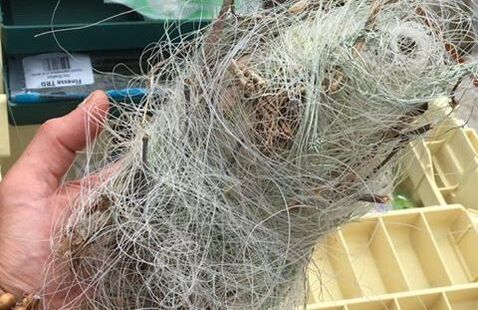|
Doug Fessler and his son spent a few hours just below the inflatable bags of the Adam T. Memorial Dam near Sunbury -- a popular location for anglers. They left with two full bags of garbage. “It’s a little disheartening, but what bothers me the most is all the left-behind fishing line,” he said. “People have developed a really bad habit of leaving things behind.”
Reports of littering issues have come from all corners of the watershed as more people embrace the outdoors during a coronavirus-laced summer. It seems that as people look for relief from one pandemic, those who carelessly leave their trash behind are causing another. As Fessler shared, it is especially sad to know that some anglers are a part of the problem -- who better understands the importance of clean waterways and has a vested interest in making sure we continue to have access to fishing opportunities … and clean fish. A recent study out of Susquehanna University highlighted the reality of our pollution -- a steady increase in microplastic fibers and other plastic-based gunk was found in sampled smallmouth bass pulled from the Susquehanna River and Pine Creek during the three-year project. Perhaps even more shocking than the percent increase -- 87 to 95 to 100 -- of how many of the fish sampled between 2017 and 2019 had plastics was the amount per fish. In 2017, they found an average of 2.3 microplastics per fish. In 2018, it went up to 6.1. In 2019, the number skyrocketed to 28.9 per fish. Even in the abnormally high waters of 2019 impacted that increase at least somewhat, there is still obviously a massive microplastic issue on our hands. Where that issue originates from is still under investigation, but most likely, it comes from a variety of sources, including the excessive buildup of litter along our waterways. Plastic never seems to biodegrade completely -- plastic shopping bags, bottles and other pieces of trash can break down from their original form, leaving behind plastic fragments that causes an unknown ripple effect of issues. “We’re heartened by many stories of residents getting outside and reconnecting with their neighborhoods, parks and trails. Unfortunately, there have also been stories of people leaving litter, dog waste and even graffiti behind in state parks, forests and other places” said Shannon Reiter, president of Keep Pennsylvania Beautiful. “If you’re one of the many Pennsylvanians spending time outdoors, please respect the environment and dispose of trash properly. Remember, if you pack it in, you can pack it out. There’s no acceptable time to litter.” This lines up with the Leave No Trace set of outdoor ethics that encourage people to make wise decisions while enjoying their natural resources. The seven principles taught via Leave No Trace include:
In Pennsylvania, there are a variety of levels to the state’s littering law, including one focused on “litter or waste deposited into or upon any road or right-of-way, land of another or into the waters of the Commonwealth.” A first offense of this violation can lead to a fine of $50 to $300 plus the offender may be required to pick up trash for between 5-30 hours, or to imprisonment for not more than 90 days (or both). That is for the first offense. Additional violations include a third-degree misdemeanor with a fine of between $300 and $1,000, and the offender may also be required to pick up trash for between 30 and 100 hours and/or imprisonment. Ultimately, however, we shouldn’t need the threat of penalties to do what is right. Our outdoor resources have provided an important escape from the realities of quarantines and restrictions -- the least we can do is pay back the favor by purposefully making it a point to not litter and to confront those who do. For tips on how to safely pick up trash in your favorite outdoor areas, click here. Like Doug Fessler, if you do help clean up our watershed, send us your photos and stories. We’d love to raise more awareness and applaud those making the extra effort. Email us your content by clicking here.
1 Comment
Leave a Reply. |
AuthorsRiverkeeper John Zaktansky is an award-winning journalist and avid promoter of the outdoors who loves camping, kayaking, fishing and hunting with the family. Archives
July 2024
Topics |

 RSS Feed
RSS Feed